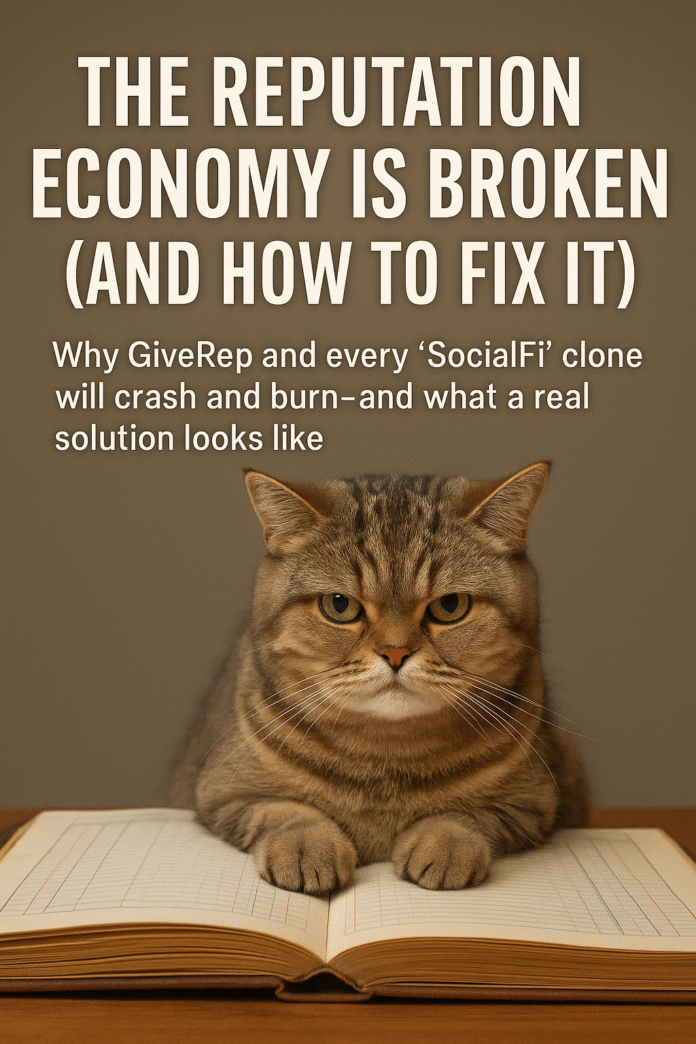You’ve probably seen the hype around GiveRep and other so-called “SocialFi” platforms—tools promising to turn your social activity into blockchain-backed reputation points. Post, comment, endorse someone, and boom—you earn $REP. Supposedly, it’s the future of trust online.
Except it’s not. It’s a predictable mess waiting to happen.
Let’s talk about why reputation matters, why platforms like GiveRep are fundamentally flawed, and what a real, skin-in-the-game solution could look like.
What Reputation Actually Means
Reputation—real reputation—is costly. It takes years to build and seconds to destroy. It’s a social contract, not a point system. When I recommend you to someone, I’m staking my personal credibility. If you screw up, it reflects on me.
In business, this is everything. Deals are done on handshakes because of reputation. Recommendations carry weight because the recommender has skin in the game.
And that’s the exact problem with tokenized reputation models like GiveRep—they strip the cost out of the equation. When reputation is free, it stops being reputation.
Why SocialFi Reputation Schemes Will Fail
GiveRep is just the latest in a long line of “engage to earn” gimmicks. The idea sounds good on paper: reward users for authentic engagement, create an on-chain reputation ledger, and unlock value for trustworthy voices.
But here’s why it won’t work—ever.
1. Wrong Incentives
The moment you attach monetary rewards to giving someone “rep,” you encourage farming, not authenticity. People won’t give reputation because they genuinely vouch for someone; they’ll do it to earn tokens.
Think about “like for like” groups on Instagram. It turns genuine endorsements into a cheap commodity.
2. Bots and Spam Will Flood It
No matter what anti-sybil measures they promise, the incentive structure invites low-quality behaviour. We’ll see bots posting AI-generated comments, spammy retweets, and fake conversations designed purely to grind $REP.
When everyone’s screaming for attention, reputation becomes noise.
3. Whales Will Hoard Influence
Early adopters, influencers, and crypto whales will dominate leaderboards simply because they already have massive followings. The average user? Forget it—you’ll grind for scraps while the top 1% dictate what “trust” means.
4. Reputation Becomes Worthless
Once people realize rep is gamed for profit, nobody will trust it. The same thing killed Klout scores years ago—people stopped caring when they saw it could be manipulated.
When “reputation” is just another token to farm, it loses all credibility.
The Solution: Skin in the Game
So, if tokenized reputation models are doomed, what’s the fix?
The answer is simple: make reputation costly again. If I want to endorse you, I should have to risk something tangible. My reputation should have downside.
This isn’t just theory—it’s how trust works in the real world. The people whose word carries weight are the ones who have something to lose if they’re wrong.
The Skin-in-the-Game Reputation Protocol
Here’s what a real solution would look like.
1. Endorsements Require Staking
If I endorse you, I have to stake tokens (or even stablecoins) behind that endorsement. The size of my stake reflects how much I believe in you.
2. Reputation Scores Weighted by Risk
My reputation score isn’t just how many people I’ve endorsed—it’s how many good calls I’ve made. Endorsing someone who succeeds boosts my score. Endorsing bad actors tanks it.
3. Slashing for Bad Calls
If you rug-pull, spam, or are flagged by the community, part of my stake gets slashed. I literally pay for backing the wrong people.
4. Yield for Accurate Calls
If you succeed, I get a small yield on my stake, or maybe a share of your project’s success tokens. This incentivizes good endorsements without letting people farm endlessly.
5. Transparency by Default
Every endorsement, stake, and outcome is logged on-chain. No secret deals. No backroom manipulation.
Why This Works
This model works because it changes the psychology.
Right now, on GiveRep and its clones, you can spray rep everywhere because it costs nothing. But if every endorsement risks real capital, you’ll only endorse people you truly believe in. That’s a reputation signal worth paying attention to.
It also naturally filters out bots and low-quality players. Spammers aren’t going to risk real money to endorse other spammers. The only people participating will be those who care about building credible reputations.
Does Anything Like This Exist?
Not really. A few projects hint at this model:
- Kleros lets jurors stake tokens on arbitration outcomes (get it wrong, lose tokens).
- Augur makes you stake reputation tokens on prediction outcomes.
- BitClout and DeSo flirted with creator coins, but they lacked downside risk.
- Coreto discusses monetized crypto reputations, but again, there is no meaningful penalty for being wrong.
Nobody has built a true “LinkedIn meets DeFi staking” platform yet. Whoever does will own the trust layer of the Web3 world.
The Hard Truth
Will this happen? Maybe. But it won’t be easy. Most people won’t want to risk real money on endorsements. It’ll be a slower, more deliberate system—not the viral hype machine SocialFi founders dream about.
And that’s the point. Real reputation isn’t supposed to scale instantly. It’s supposed to be earned carefully, at a cost.
So go ahead, chase $REP if you want. But don’t fool yourself into thinking it means anything. Until we put skin in the game, all these tokenized reputation schemes are just louder, shinier versions of the same broken “like for like” economy we already have.
TL;DR
- GiveRep & SocialFi reputation models will fail because they reward farming, not authenticity.
- Reputation only works if it’s costly—you need something to lose.
- The fix? A skin-in-the-game protocol where endorsements require staking tokens, with real downside if you back the wrong people.
- Nobody’s built this yet—the first one who does could redefine online trust.
⸻
Your Turn
💬 What do you think? Would you stake real money behind someone’s reputation if it meant your own reputation—and wallet—was on the line?
Drop a comment. I’m curious—would you trust a “skin-in-the-game” system more than these SocialFi hype machines, or do you think the whole idea of tokenized reputation is doomed either way?
Q&A Summary:
Q: Why does the blog post argue that platforms like GiveRep are flawed?
A: The blog argues that platforms like GiveRep are flawed because they remove the cost from reputation. By attaching monetary rewards to giving reputation, they encourage farming and inauthenticity rather than genuine endorsements. They also invite low-quality behavior such as spam and allow for manipulation, making reputation worthless over time.
Q: What is the proposed solution to the problem with tokenized reputation models?
A: The proposed solution is to make reputation costly again. This includes requiring endorsements to stake tokens or stablecoins, weighting reputation scores by risk, penalizing bad endorsements by slashing part of the stake, rewarding good endorsements with a yield or share of success tokens, and making all transactions transparent and logged on-chain.
Q: What would a 'skin-in-the-game' reputation protocol look like?
A: A 'skin-in-the-game' reputation protocol would require endorsements to stake tokens or even stablecoins. Reputation scores would be weighted by risk, with endorsing successful individuals boosting your score and endorsing bad actors lowering it. Bad calls would be penalized by slashing part of the stake, while accurate calls would be rewarded with a yield or a share of success tokens. All transactions would be transparent and logged on-chain.
Q: Why does the blog post argue that a 'skin-in-the-game' reputation protocol would be more effective?
A: The blog post argues that a 'skin-in-the-game' reputation protocol would be more effective because it would change the psychology of reputation. With real capital at risk, individuals would only endorse those they truly believe in. It would also filter out bots and low-quality players, as they would be unwilling to risk real money. This would make it a reputation signal worth paying attention to.
Q: Does any platform currently exist that uses a 'skin-in-the-game' reputation protocol?
A: According to the blog post, there is no platform that fully implements a 'skin-in-the-game' reputation protocol. While there are some that hint at this model, like Kleros, Augur, BitClout, and Coreto, none of them have a meaningful penalty for being wrong, which is a key aspect of the proposed solution.

